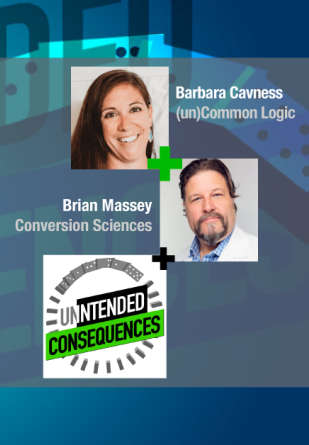Building a Culture of Experimentation in a Creative Business
Barbara Caveness of Uncommon Logic tells us how she builds and manages teams that are both data-driven and creative.
What job description would a marketing manager write if they wanted experimenters in their organization? I think it might go something like this.
Title: Marketing Experimenter
Primary job description: Making people aware of our products and persuading them to purchase them.
You are perfect for this role if:
-
- You are not confident in your ability to create digital campaigns that will connect with our prospects.
- You fail frequently and with minimum impact.
- You do not consider yourself an intuitive copywriter.
- Your do not have an intuitive sense of design.
- You are good at holding off helicopter executives.
- You ignore the expectations of others, unless they are prospects or customers.
- You can waste time strategically.
- You forget past victories easily.
- You are unmoved by cool agency designs.
- You’ve master the tools necessary to learn how to speak to our prospects.
- You are good at talking about data and sharing it with teammates.
- Must be good at asking questions.
- You know how to celebrate successful campaigns.
- You know how to celebrate failures.
- If this is you, please apply immediately.
If any of these qualifications seem counterintuitive to you, don’t worry. We are all going to have to learn to work with this kind of curious, disciplined and creative person.
Would you want people like this working in your organization. I suspect you may already have these kinds of people on your team. So the real question will be, would this person be delighted to be in your organization?
To help understand these kind of people, I invited Barbara Cavness to join me on this episode of Intended Consequences.
Barbara is the CEO of (un)Common Logic – a digital marketing agency that you might be tempted to put into the category of “Search Engine Marketing”. But this is really an organization that enables teams of talented people to do great things. Her team investigates digital marketing data to find the surprising facts that can solve their clients toughest problems.
Barbara is very purposeful in her approach to building teams, even though she encounters all of the same obstacles that we do. Learn how this former Duke University lacrosse player became the head of a marketing organization and how she fosters teamwork, curiosity, and creativity.
Fostering curiosity
You know, there are a lot of ways you can free up time and provide opportunities to learn and try new things. There are a lot of overt and subtle ways that you can nurture that.
Gone are the days of the unsophisticated digital marketer.
The vast majority of the clients at least that we serve are very sophisticated marketers themselves so they can spot a fake from about a mile away.
Data can save the day.
OK. Hang on. Deep breath. What does the data tell us.
The importance of pushing your team and investing in your culture.
We have a lot of young people on our team obviously. It is a young company, young industry etc. And so they’re sort of still finding their way when it comes to maximizing their potential. You know, it always comes back to sports for me right. You know I love also being a coach. I love pushing my team.
On doubts
Go run through that wall. You can absolutely do it.
Resources and links discussed:
- Connect with Barbara
- Learn more about (un)Common Logic
- Follow Brian on Twitter @bmassey
When you get back to the office…
Take a look at your work day. Write down the top five things you do in your role.
Then, for each rate yourself on a simple Experimentation Scale.
In those roles in which you are the initiator of experimentation, give yourself a 3. These are the roles in which you often say, “Let’s study that,” or “Who could we survey?” or “Do we have any history to look at?”
For those roles in which you are a preventer of experimentation, give yourself a 1. This is not a bad thing. We need people on our teams to help us focus our experimenters. This is like the control rods in a nuclear plant. They slow the activity, and are very important.
For those roles that you’re not sure about, give yourself a 2.
In which of these roles do you find yourself most satisfied. In which are you frustrated? Is there a pattern?
I’ll leave you to decide for yourself what this simple exercise means?
That’s all for now scientists.
- How to Compare Data When You Move from Google Analytics to GA4 - April 7, 2023
- CRO and SEO Working Together with Jason Fisher - November 17, 2022
- Why Web Design for Conversion Needs Science - May 4, 2022


















Leave a Reply
Want to join the discussion?Feel free to contribute!